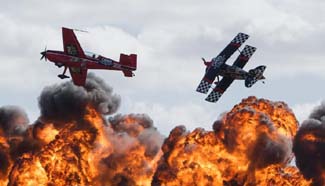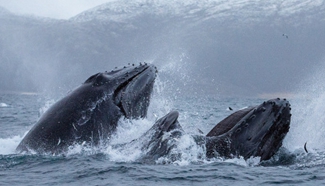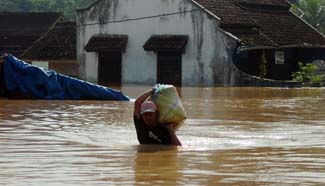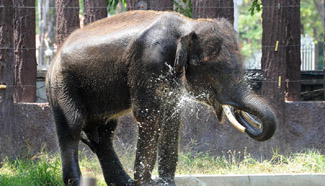The “Joint Action-2015A” exercise ended on Oct. 13 at a plateau training base in Golmud, Qinghai Province. It also concluded the series of five Joint Action-2015 exercises held by the Chinese military this year. The other four, involving maritime and airborne activities, were held in training bases by military area commands in Nanjing, Guangzhou, Chengdu and the navy.
Biggest joint exercises
The five live-fire exercises were the biggest of their kind held by the Chinese military in the field of joint training in terms of troop numbers and comprehensive display of military elements. The exercises involved all systems and all elements of the military, with full participation by both strategic and tactical departments and all-dimensional training on land, at sea, in the air, and in the aerospace, cyberspace and electromagnetic fields.
Led by various military area commands and services, the exercises also involved assisting forces, including reserve units of the army, navy, air force and provincial military area commands as well as armed police forces and headquarters intelligence, tech reconnaissance, electromagnetic, cyber, psychological, logistics, and equipment forces. They mobilized more than 140,000 troops from more than 140 regiments. The army deployed more than 700 pieces of armored equipment, over 1,300 artillery pieces and missiles and over 500 helicopter sorties, while the air force deployed more than 140 fighter jets on 600 tasks. The navy put to use more than 150 warships and several missile barracks of the Second Artillery Force also participated.
The “Joint Action-2015D”exercise, led by the Chengdu Military Area Command, was the first of the series. The 13th and 14th group armies, a command post of the air force, four air divisions, a unit of the Second Artillery Force and forces from the reserve units took part in the exercise, which focused on joint delivery, command, close-range air support and taking key targets. The exercise involved comprehensive elements in actual combat conditions with the air force, army and the Second Artillery Force staging joint missions in mountainous regions above an altitude of 4,000 meters.
The “Joint Action-2015B” exercise, led by the Nanjing Military Area Command, mainly involved the command’s forces and the 12th Group Army as well as the navy, air force and the Second Artillery Force. Employing a “less is more” strategy, the exercise tested joint operations by the army, navy and air force. It mainly focused on research of the establishment of a combat system, organization and application of the information system, long-distance delivery, joint intelligence reconnaissance, joint information-enabled strikes, joint information attack and defense, breaking barriers, coordinated combat and integrated logistics support.
The “Joint Action-2015C”exercise, organized by the Guangzhou Military Area Command, involved the army, navy, air force and the Second Artillery Force. Adhering to requirements on strategic support, command and tactical operations, it aimed to build smooth information exchanges between the services. Based on all-element and system-wide operations as well as command and control by information system, it introduced new combat forces and coordinated operations under joint command. It further enhanced connections among the army, navy and air force, and realized seamless coordination among different arms in command and combat.
The just-concluded “Joint Action 2015-A”, led by the Lanzhou Military Area Command, involved air force fighter jets, the conventional missile unit of the Second Artillery Force, the special operations brigade of Xinjiang military command, army air forces, as well as the 47th and 21st group armies, armored brigades and artillery. Reserve forces of the Qinghai Province military command, auxiliary logistics forces of the Lanzhou Military Area Command and strategic support forces from headquarters also took part. The exercise focused on joint combat command, precision strikes, taking targets, operations coordination and combat support.

















